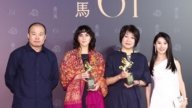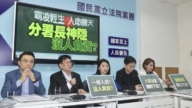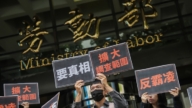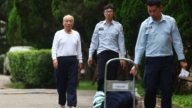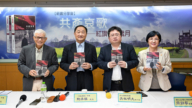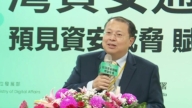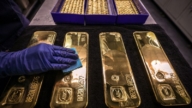【新唐人2011年12月5日訊】中華民國2012總統大選首場電視辯論會12月3號登場,現任總統兼國民黨候選人馬英九、民進黨候選人蔡英文及親民黨候選人宋楚瑜首度同臺,就內政民生、兩岸外交等問題交鋒,引起海內外高度關注,中共當局及媒體卻保持低調,而大陸網民則羨慕並熱烈議論台灣民主盛事。
首場辯論會是台灣總統大選三場電視辯論之一,由台灣公共電視臺與《中央社》以及四家報紙合辦,另有30多家媒體連線報導。辯論會分申論、媒體提問、候選人詰問和結論四段。
在兩岸關係部分,馬英九表示,「不統、不獨、不武」是台灣的主流民意,「九二共識」也就是「一個中國,各自表述」符合憲法,是擱置爭議、共創雙贏的最好辦法。
馬英九:「民進黨最不讓人放心的,就是沒辦法處理兩岸關係,製造衝突造成烽火外交,我們願意回到民進黨執政時候,8年臺海緊張關係的台灣嗎?」
民進黨候選人蔡英文則表示,兩岸之間有1992年的會談,但是沒有所謂的「九二共識」,如果政府領導人接受一個不存在的東西,是不對的事情。
蔡英文:「『九二共識』是國民黨跟共產黨的一個共識,2008年馬總統就任以後,把這個國共的共識,沒有經過民主的程序,把它轉化成為一個兩岸的共識,這是一個傷害台灣民主最大的地方。『台灣共識』講究的是一個民主的程序。」
蔡英文提出,「台灣共識」是具有包容性的,也可以將「一中各表」納入一併討論,從而才能化解內部分歧,為兩岸關係的發展找出可長可久的新互動基礎。
馬英九則表示,所謂「台灣共識」像個百寶箱,好像甚麼都有,但不知道哪個才是共識。如果不承認「九二共識」,兩岸關係將陷入不確定,對台灣非常不利。
台灣媒體引述北京涉臺權威人士的話表示,大陸從國家領導人到國臺辦主任王毅,近來在各項場合重申,「九二共識」是兩岸開展對話協商的必要前提。但如果民進黨不接受「九二共識」政治基礎,未來兩岸關係如何向前走?
台灣時事評論家林保華:「中國當然是支持馬英九,當然支持它也不敢太公開,太公開台灣人會反感,說你國共勾結、你國民黨想主宰台灣的命運。中國本來一直是不表態的,其實每次選舉中國方面都釋放一些所謂『善意』,但是這些台灣人並不買賬。在這情況下,中國覺得收買不行的話就恐嚇了。」
在辯論會上,對於馬政府簽署的兩岸經濟合作架構協議(ECFA),宋楚瑜給予正面肯定,蔡英文也由過去強烈反對,轉為可以概括承受。
台灣媒體民調顯示,這場辯論馬英九先勝一籌。香港媒體讚譽台灣主辦媒體提問不留情面,表現出「第四權力的風範」。
中共當局沒有對此辯論會作出回應,大陸中央級媒體如《新華社》、《人民日報》、《央視》顯得十分低調,僅作簡短或轉載報導。
而大陸網民對台灣總統大選辯論議論熱烈。有的網友說:「這樣的君子之爭!太給力!震撼!兩岸政治文明高下立判。」更有網友問:「甚麼時候可以辦國家主席直選辯論?」
北京憲政學者陳永苗表示,台灣大選的民主示範會在大陸產生很積極的啟蒙。
陳永苗:「它會成為一個積極的樣板。所有的經濟、社會條件、文化條件都差不多,既然台灣可以民主化,都可以民主選舉,而且民主會給台灣或者中華民族帶來很大的利益、或者帶來很多的好處。那大陸人民自然通過現有的資訊條件、通過互聯網、電視看得到,就相當於它們慢慢都一直在做民主化的宣傳,台灣因素﹙民主﹚的存在會加速中國民主化的進程。」
辯論會最後結論時,馬英九強調,挑戰經濟問題,促進兩岸和平,他最受信賴。蔡英文指出,她不容國家主權被霸凌。宋楚瑜則說,他要重現台灣人民對政府的信任。
新唐人記者易如、李元翰、周平採訪報導。
Low-Key CCP vs. Heated Civilians over 2012 Taiwan Election,
The 2012 Taiwan presidential election of the Republic of
China kicked off on December 3.
The first televised presidential debate was initiated between
Ma Ying-jeou, incumbent President and Kuomintang (KMT) candidate,
Tsai Ing-wen, the Democratic Progressive Party (DPP)
candidate, and James Soong Chu-yu, the People First Party (PFP) candidate.
The debate covered issues including internal affairs of people’s livelihood,
And cross-straits diplomatic relations.
The debate attracted attention both home and abroad,
while the Chinese Communist Party (CCP) regime and its official media did not profile it highly.
Mainland China’s netizens, in contrast,
held heated discussions over this democratic election.
This is the first of three televised debates for Taiwan
presidential election,
co-organized by Taiwan’s public television stations,
Central News Agency and four newspapers,
with on-line reports by over 30 media outlets.
The format for the debate went through four phases:
scripted openings for each candidate,
questions from the media, questions from candidates to
their rivals, and scripted summations.
On the debate over the cross-straits relation issue,
Ma Ying-jeou said that Taiwan’s mainstream public opinion is the “no unification,
no independence and no use of force" principle.
The 1992 Consensus, i.e. “one China, respective
interpretations" is in line with the Constitution,
the best way for the two sides to shelve differences and
create a win-win.
Ma Ying-jeou, “The least reassuring thing of the DPP is their
inability to handle cross-strait relations.
They created conflicts which triggered scorched
earth diplomacy.
Are we willing to return to the eight-year』s reign of the DPP
that features strained relations across the Taiwan Strait?"
The DPP candidate Tsai Ing-wen said that the meeting
was held between the two sides in 1992,
but without reaching the so-called “1992 Consensus".
If a government leader accepted a non-existent thing,
it is not right.
Tsai Ing-wen," The 1992 Consensus is a consensus reached
between the KMT and the CCP.
After taking office in 2008, President Ma turned this consensus,
without going through a democratic process, into a one between two sides.
This is the biggest focus that hurts Taiwan’s democracy.
The spirit of the Taiwan consensus is via democratic processes.”
Tsai Ing-wen states that the Taiwan consensus is inclusive,
“one China, respective interpretations" can be incorporated into the discussion to settle internal differences
and find a sustained new interactive basis for the
development of cross-strait relations.
Ma Ying-jeou argues that the so-called Taiwan Consensus
is like a treasure chest, with everything in it, but one cannot tell which is the consensus.
If the “1992 consensus" cannot be recognized,
the cross-strait relations will be plunged into uncertainty, which is definitely not conducive to Taiwan.
The Taiwan media quoted a Taiwan-affairs related
authoritative official, saying that in terms of mainland China,
from national leaders to Wang Yi, director of State Council
Taiwan Affairs Office, reiterated that the “1992
consensus" is the necessary prerequisite for two sides’
negotiations and cross-strait dialogue.
But if the DPP does not accept the political foundation of
the “1992 Consensus", then how will the cross-strait relations move forward in the future?
Taiwan commentator, Lin Baohua: “China’s regime
Certainly supports Ma Ying-jeou.
Of course, it dares not to make it too open.
This could incur Taiwanese resentment,
saying that the CCP colludes with the KMT,
while the KMT wants to dominate the fate of Taiwan.
China』s regime have long been holding its fire,
while in reality, at each presidential election,
it released some so-called “goodwill",
but the Taiwanese think nothing of it.
In this context, if China’s regime』s approach is that
if buying off doesn’t work, then they will turn to threats. “
Over the debate, the Economic Cooperation Framework
Agreement (ECFA) signed between by the Ma government
And the CCP regime was given applause by James Soong.
Tsai Ing-wen expressed general acceptance, diverting from
his past strong opposition.
Taiwan media poll showed that
Ma Ying-jeou got leverage from this debate.
Hong Kong media praised Taiwan sponsored media』s
unflinching questions to the candidates, displaying “the fourth power’s style”.
The CCP regime did not respond to this debate.
Its central-level official media like Xinhua News Agency,
People’s Daily and CCTV did not give it a high profile,
only making brief reports or reproduction.
In contrast, China’s netizens held heated discussions over
this election.
A netizen posted, “A joust among gentlemen! Brilliant!
Shocking!
You can tell instantly the difference of political civilization
between two sides. ”
Another netizen asked,
" When will they hold China’s presidential debate? ”
Beijing-based constitutional scholar, Chen Yongmiao,
believes that Taiwan’s presidential election has set a
democratic model for mainland Chinese people,
and will give a very positive enlightenment to them.
Chen Yongmiao: “It will become a positive model.
The general economic, social and cultural conditions are
similar between the two sides.
Taiwan has held a democratic election, and democracy
brings Taiwanese people great benefits.
Now the mainland Chinese people can get the information
via internet or TV.
That equals to a gradual awareness of democratization.
The existence of Taiwan’s democracy will accelerate
China’s democratization process. “
At the end of the debate, Ma Ying-jeou stresses that
he is the most trusted to challenge the economics issues
and to promote cross-strait peace.
Tsai Ing-wen says that she will not to tolerate any bullying
over the national sovereignty.
Soong states that he will bring back the Taiwan people』s
trust in the government.
NTD reporters Yi Ru, Li Yuanhan and Zhou Ping



